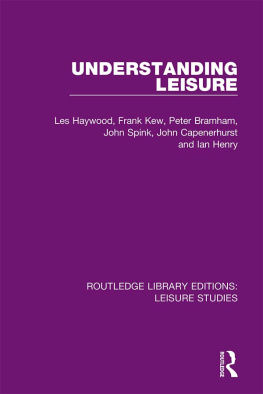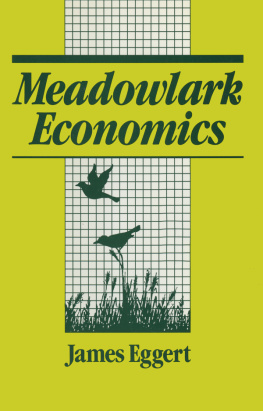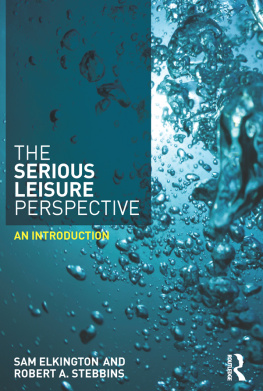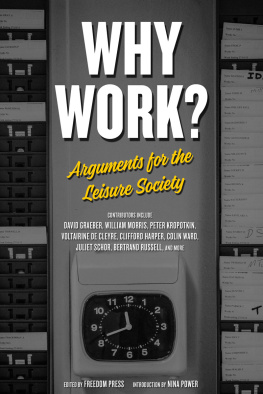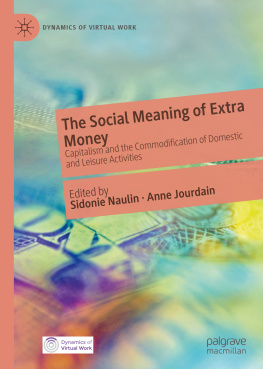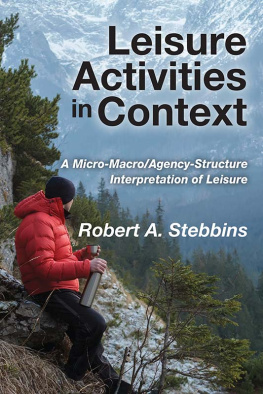EMERALD STUDIES IN DEVIANT LEISURE
Series Editors:
Thomas Raymen, Plymouth University, UK; Oliver Smith, Plymouth University, UK; Steve Redhead, Flinders University, Australia.
The Emerald Studies in Deviant Leisure series examines the relationship between commodified leisure and harm. The series provides a forum for publications that explore the harms of commodified leisure against a wider backdrop of consumerism and global capitalism. The series transcends disciplinary boundaries and will publish work from the fields of Criminology, Sociology, Youth Studies, Leisure Studies, Tourism Studies, Cultural Geography, Urban Studies and more. The series publishes monographs, edited collections and short books (between 20,000 and 50,000 words). Proposals from early career researchers are particularly welcome.
Titles in this series
Thomas Raymen, Parkour, Deviance and Leisure in the Late-Capitalist City: An Ethnography
Emerald Publishing Limited
Howard House, Wagon Lane, Bingley BD16 1WA, UK
First edition 2018
Copyright Leanne McRae, 2018. Published under exclusive licence
Reprints and permission service
Contact:
No part of this book may be reproduced, stored in a retrieval system, transmitted in any form or by any means electronic, mechanical, photocopying, recording or otherwise without either the prior written permission of the publisher or a licence permitting restricted copying issued in the UK by The Copyright Licensing Agency and in the USA by The Copyright Clearance Center. No responsibility is accepted for the accuracy of information contained in the text, illustrations or advertisements. The opinions expressed in these chapters are not necessarily those of the Author or the publisher.
British Library Cataloguing in Publication Data
A catalogue record for this book is available from the British Library
ISBN: 978-1-78756-526-5 (paperback)
ISBN: 978-1-78756-523-4 (E-ISBN)
ISBN: 978-1-78756-525-8 (Epub)
INTRODUCTION: TERROR IN OUR TIMES
We also have little idea of what it is to burn with a sense of injustice and oppression, and what it is to give our lives for a cause, to be so desperate or earnest. We think of these acts as mad, random and criminal, rather than as part of a recognisable exchange of violences.
(Kureishi, 2005, p. 91)
Hanif Kureishi wrote these words in 2005, offering up an evocative template for understanding extremism. These words resonated in the shadow of 9/11 to germinate awareness into how the hijackers could and would willingly sacrifice themselves to fly planes into the World Trade Center and murder 3,000 civilians. In the same article, Kureishi (2005) unravels these tropes further and asserts a detailed sense of the emotional repertoire that permits humans to envelope radical contradictions and perverse violences by arguing that the body-hatred and terror of sexuality that characterise most religions can lead people not only to cover their bodies in shame but to think of themselves as human bombs (p. 93). The atomisation of bodies, identities and selves he evokes is mirrored in the fracturing of community worldwide where individuals can no longer see their interests in relation to others of a similar socio-economic position (Winlow & Hall, 2013, p. 17) and as such, now live in an era of post-political biopolitics (Winlow & Hall, 2013, p. 17) where lives are disposable and bodies are stripped of meanings motivated by their decades as cogs in a capitalist machine first as workers, then as consumers. Nine years later, the consequences of fragmented bodies, communities and identities have become acute. Richard Barrett (2014) of The Soufan Group a security intelligence service provided by Federal Bureau of Investigation, UK and National Security Agency intelligence veterans wrote the self-styled Islamic State is an accident of history (p. 1) suggesting that the complex international and regional relationships that have contributed to the creation of Islamic State of Iraq and Syria (ISIS) are isolated and random. While Barrett acknowledges the multiple social, political and economic factors contributing to its emergence, this statement suggests that a concrete, trackable pathway to ISIS is not available. This is not the case. It becomes very clear that nothing but extremism could exist in this time and place when we widen our gaze to consider the perspectives writers like Kureishi offer. ISIS is not an accident but a rationalised and realistic reaction and consequence of systemic power relations and corrosive capitalist trajectories that require the exploitation and dispossession of particular groups in our world for the benefit and prosperity of others. Steve Hall (2012), has called this special liberty; a condition of contemporary global capitalism that requires inflicting harm on others to simply get things done to satisfy the demands of business in a competitive environment (p. 8). This callous discard of others is part of a violent and disposable social structure that rewards selfishness and works to deconstruct social ties that might mitigate or dispel these aggressions. The neoliberal context for this style of capitalism validates augmented egoism, narcissism and competitive individualism (Hall, Winlow, & Ancrum, 2012, p. 8) in the service of a market economy that values profit for the few above all. The emergence of ISIS speaks to these conditions, and their attacks in Europe from 2014 deploy these meanings in a new framework for terror one that is in dialogue with a critically failing capitalism, the excesses of consumption and the criminal behaviour of governments and corporations in unlawful invasions and financial failure that punishes and criminalises the poor for the harms that were inflicted upon them, while protecting the criminal negligence of financial elites whose systemic exploitation lead to the 2008 Global Financial Crisis (GFC). It is also a context of grotesque hypocrisy where the powerful violate the very rules they try to impose (Hall et al., 2012, p. 8) on others and indeed bring the full force of domestic and international law and legal systems to punish those that seek to contradict the imposing persistence of market capitalism. Now Europe is a crucible for an exchange of violences that are located in the crises of capitalism that have crept across the globe and accelerated in the post-Global Financial Crash period. The burning sense of injustice and oppression is released in a tidal wave of harmful attitudes and outcomes. This emotional repertoire rendered in the rise of populism and swing of voters to the extreme right wing in the United States and Europe, the Brexit vote in the United Kingdom and the increasing visibility and impact of jihadist terrorist organisations including Al-Qaeda, its many direct and indirect affiliates, as well as its nemesis; ISIS.
ISIS is a horrifyingly brutal organisation devoted to accelerating the end of times, terror and destruction. While it would be easy to map the emergence of ISIS as a result of colonial pasts and perversions, laying the blame on invading elites from the Crusades to the offences wrought by the Sykes-Picot Agreement, such a trajectory must also include the corruption of local leaders and elites who betrayed the welfare of their citizens for short-term political or economic gain. These are the trajectories normalised within an evolving and encompassing capitalism that seeks out exploitations in new markets wherever it can. The harmful consequences having been entrenched throughout the Third World are now beginning to weave their way into empowered contexts where populations have previously enjoyed the benefits of capitalism via consumer fetishisation and leisure opportunities. Europe, the United States, Australia, New Zealand, for example, have emerged out of a Global Financial Crash that was the most severe economic downturn since the Great Depression (Tienhaara, 2018, p. 5). It resulted, not in correction of attitudes and legislation, but in the reanimation of the very system that failed with only minor interventions into the grotesque policies and outlooks that permitted such financial negligence (GAO US Government Accountability Office, 2013, p. 12). The consequences of special liberty are no longer displaced onto the Third World but located in the heart of capital where the working class become the working poor or the workless and citizens are widely disenfranchised from democratic process and civic rights (Winlow & Hall, 2013). Such conditions have been slowly etching their way through the economic landscape over decades. Since the 1980s, real wages in rich countries have stagnated (Standing, 2016, p. 21). While the labour share fell in the US from 53 per cent in 1970 to 43.5 per cent in 2012 (Standing, 2016, p. 20) corporate profits more than tripled in real terms between 1980 and 2013 (Standing, 2016, p. 21). The Global Financial Crash was precipitated by the collapse of subprime mortgages in the United States which resulted in the financial system becoming insolvent since it could not service its debts (Lapavitsas, 2013, p. 278). This crisis was caused by cavalier removal of regulatory oversight of banks and a perverse paradigm where such bankers and other experts are allowed to squash democracy (iek, 2012a, p. 13) via the elevation of capital interests over the social good. Working life no longer offers the potentials and possibilities it once did. Casual, part time and no-hours contract labour means that a living wage is increasingly beyond reach. The working class has been atomised and there is a:


